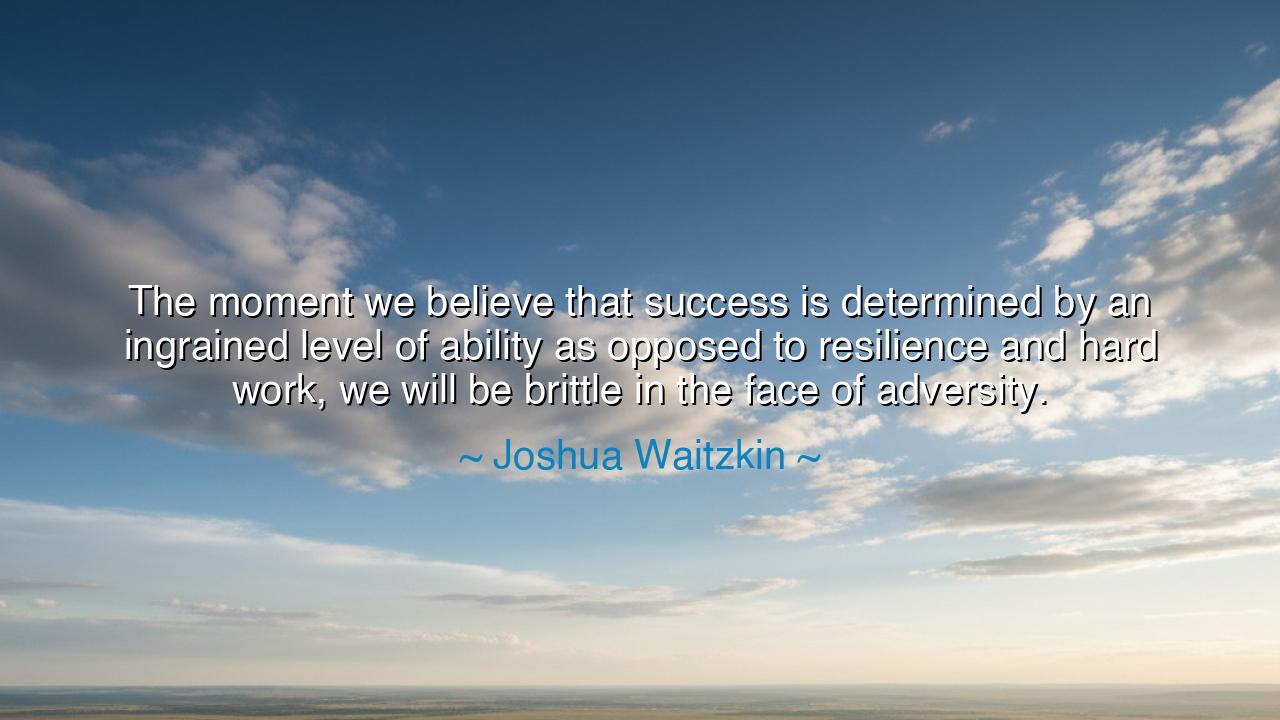
The moment we believe that success is determined by an ingrained
The moment we believe that success is determined by an ingrained level of ability as opposed to resilience and hard work, we will be brittle in the face of adversity.






Hear the words of Joshua Waitzkin, the prodigy turned master of both chess and martial arts, who proclaimed: “The moment we believe that success is determined by an ingrained level of ability as opposed to resilience and hard work, we will be brittle in the face of adversity.” In these words lies a warning and a gift: that greatness does not belong to the chosen few born with rare talent, but to those who endure, who labor, who rise again when they fall.
When he speaks of success, he tears away the illusion that it is written in blood or bestowed by fortune. He names instead the true foundations: resilience and hard work. These are the stones upon which enduring victories are built. Talent may open a door, but it is effort that keeps it open. Skill may be born in us, but without toil it withers like a seed never watered. Thus, the wise must never worship ability as destiny, but must embrace the labor that strengthens the soul.
Waitzkin warns that to cling to the belief in ingrained ability is to become brittle in adversity. For when hardship comes—and it always comes—the one who trusts only in talent will crumble, for talent does not teach endurance. The man who has never struggled does not know how to rise. The woman who has never failed does not know how to endure. But those who have built themselves through persistence, through countless small battles, stand like oak trees in the storm.
History bears witness. Consider Thomas Edison, who when asked about his failures in inventing the light bulb, replied: “I have not failed. I’ve just found 10,000 ways that won’t work.” He was not a man who relied upon the gift of genius alone, but one who leaned upon resilience. His invention was not born of innate brilliance alone, but of relentless effort. It was his refusal to break in the face of failure that illuminated the world.
So too we see in the life of Abraham Lincoln. His youth was not blessed with privilege, nor was he hailed as a prodigy. He faced repeated defeats—failed businesses, failed elections, personal tragedies. Yet he did not accept that his worth was defined by failure or by lack of natural power. Instead, he endured, worked, and rose again. And by his persistence, he became one of the greatest leaders of his nation, guiding it through its darkest hour.
O children of tomorrow, take this teaching into your hearts: do not worship the myth of talent. It is a fragile idol. Instead, build your temple upon resilience and hard work. When you fall, rise again. When the path is long, take one step, and then another. Let adversity be your teacher, not your conqueror. For those who endure become unbreakable, while those who depend only on gifts are shattered when storms appear.
Let your practice be thus: embrace effort, cultivate patience, and welcome difficulty as the forge of strength. When praise comes for your talent, do not grow proud, but ask yourself if you have trained enough, endured enough, worked enough. Let your victories be born not of accident, but of persistence. In this way, you will not be brittle, but supple and enduring, bending without breaking, standing when others have fallen.
So remember Joshua Waitzkin’s words: success belongs not to the gifted, but to the resilient. Talent may dazzle, but resilience endures. Hard work will carry you where talent alone cannot tread. And when adversity rises like a tide, you will not sink—you will rise upon its waves, stronger for the struggle, and unshaken in your pursuit of greatness.






AAdministratorAdministrator
Welcome, honored guests. Please leave a comment, we will respond soon